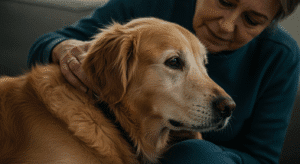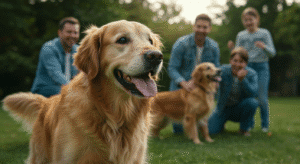The golden years can truly be golden for many Golden Retrievers who, with proper care and attention, continue to experience joy, vitality, and meaningful connections well into their senior years. These inspiring stories demonstrate that aging doesn’t have to mean decline, but rather can represent a time of deeper bonds, gentle adventures, and continued happiness when approached with understanding and dedication.
Real-life examples of senior Golden Retrievers who have thrived provide hope and practical insights for families caring for aging companions. These stories highlight the difference that proper care, environmental adaptations, and loving attention can make in maintaining quality of life throughout the senior years.
Understanding how other families have successfully navigated senior dog care challenges while maintaining happiness and health provides valuable guidance and inspiration for creating positive experiences during the golden years. These stories celebrate the resilience of senior Golden Retrievers while demonstrating the profound rewards of dedicated senior care.
Stories of Resilience and Adaptation
Overcoming Mobility Challenges
Charlie’s Journey: From Arthritis to Adventure
Charlie, a 12-year-old Golden Retriever, was diagnosed with severe arthritis that initially left his family worried about his future mobility and happiness. Through a combination of pain management, physical therapy, and environmental modifications, Charlie learned to adapt while maintaining his love for outdoor adventures.
His family installed ramps throughout their home, invested in an orthopedic bed, and worked with a canine rehabilitation therapist to develop a gentle exercise program. Within months, Charlie was enjoying modified hikes, swimming sessions, and comfortable family activities that accommodated his physical needs.
The key to Charlie’s success was his family’s willingness to adapt activities rather than eliminate them entirely. They discovered that shorter, more frequent walks and swimming sessions actually improved his mobility while maintaining the outdoor experiences he loved most.
Charlie’s story demonstrates that mobility challenges don’t have to end adventure, but rather require creative adaptation that can lead to new discoveries and continued joy in daily activities.
Bella’s Transformation: Regaining Confidence
Bella, a 10-year-old Golden Retriever, had become increasingly reluctant to move due to hip dysplasia that made her fearful of slipping and falling. Her family noticed her withdrawing from activities she once enjoyed, spending most days lying quietly in her bed.
Through patience and gradual confidence-building activities, Bella’s family helped her rediscover her love of movement. They started with non-slip mats throughout the house, supportive harnesses for walks, and gentle encouragement that rebuilt her confidence in her physical abilities.
The breakthrough came when they introduced hydrotherapy sessions at a local canine rehabilitation center. The buoyancy of warm water allowed Bella to move freely without joint stress, gradually rebuilding her strength and, more importantly, her confidence in her body’s capabilities.
Bella’s transformation from a fearful, withdrawn dog to one who eagerly anticipated her swimming sessions and gentle walks shows how addressing both physical and emotional aspects of mobility issues can restore joy and confidence.
Health Challenge Success Stories
Max’s Recovery: Conquering Cancer with Grace
Max, an 11-year-old Golden Retriever, was diagnosed with lymphoma, a diagnosis that initially devastated his family. However, with proper veterinary care and unwavering family support, Max not only survived his treatment but thrived during his recovery and beyond.
His family worked closely with an oncology veterinarian to develop a treatment plan that balanced effectiveness with quality of life considerations. They modified his diet, created comfortable recovery spaces, and maintained routines that provided stability during treatment periods.
Throughout chemotherapy, Max continued to enjoy gentle walks, family time, and his favorite activities, adapted to accommodate his energy levels and treatment schedule. His positive attitude and his family’s dedication to maintaining normalcy helped him navigate treatment successfully.
Max lived for three more happy years after his initial diagnosis, demonstrating that cancer doesn’t have to mean the end of joy but can be managed while maintaining meaningful, comfortable life experiences.
Thriving Senior Golden Retrievers: Success Factors
| Success Story | Primary Challenge | Key Interventions | Outcome Achieved | Lessons Learned |
|---|---|---|---|---|
| Charlie (Arthritis) | Severe joint pain, mobility loss | Pain management, physical therapy, home modifications | Continued outdoor adventures, improved mobility | Adaptation enables continued enjoyment |
| Bella (Hip Dysplasia) | Fear, withdrawal, loss of confidence | Hydrotherapy, confidence building, environmental support | Restored enthusiasm, active participation | Addressing emotional needs alongside physical |
| Max (Cancer) | Lymphoma diagnosis, treatment challenges | Veterinary partnership, routine maintenance, quality focus | 3 additional happy years post-diagnosis | Quality of life can be maintained during treatment |
| Luna (Cognitive Changes) | Memory issues, confusion, anxiety | Routine consistency, environmental support, patience | Maintained family bonds, reduced anxiety | Structure and patience support cognitive challenges |
| Duke (Multiple Conditions) | Arthritis, heart disease, vision loss | Coordinated care, lifestyle adaptation, family commitment | Comfortable final years, maintained dignity | Comprehensive care addresses multiple needs |
Cognitive Health Success Stories
Luna’s Adaptation: Navigating Cognitive Changes
Luna, a 13-year-old Golden Retriever, began showing signs of cognitive dysfunction that worried her family. She would sometimes seem lost in familiar places, forget routines, or appear anxious about changes that previously wouldn’t have bothered her.
Rather than viewing these changes as insurmountable problems, Luna’s family adapted their approach to support her changing needs. They established consistent routines, created clear pathways through their home, and developed patient, gentle ways of helping Luna navigate daily activities.
The family discovered that Luna responded well to routine consistency and gentle guidance. They learned to give her extra time for processing and decision-making while providing reassurance that helped reduce her anxiety about confusion or disorientation.
Luna continued to enjoy family interactions, gentle walks, and comfortable routines for several more years, demonstrating that cognitive changes can be managed successfully with understanding and appropriate environmental support.
Rocky’s Routine: Structure Supporting Success
Rocky, a 12-year-old Golden Retriever, developed mild cognitive dysfunction that initially disrupted his sleep patterns and daily routines. His family noticed increased nighttime restlessness and daytime confusion that affected his comfort and their household peace.
Working with their veterinarian and a canine behaviorist, Rocky’s family developed a structured daily routine that provided predictability and security. They established consistent meal times, walk schedules, and bedtime routines that helped Rocky feel more oriented and secure.
The implementation of environmental modifications such as night lighting, consistent furniture placement, and clear daily schedules helped Rocky maintain his comfort while reducing anxiety-related behaviors that had been disrupting his rest.
Rocky’s success with structured routines shows how thoughtful environmental management and consistent schedules can significantly improve quality of life for senior dogs experiencing cognitive changes.
Multi-Challenge Management Stories
Duke’s Comprehensive Care: Managing Multiple Conditions
Duke, a 14-year-old Golden Retriever, faced multiple age-related challenges including arthritis, early-stage heart disease, and gradual vision loss. His family initially felt overwhelmed by the complexity of managing multiple conditions simultaneously.
Through close partnership with their veterinary team, Duke’s family developed a comprehensive care plan that addressed all his conditions while maintaining his comfort and happiness. They coordinated medications, adapted his environment for vision changes, and modified activities for his heart and joint health.
The key to Duke’s success was viewing his care holistically rather than treating each condition separately. His family learned to balance rest with gentle activity, manage medications effectively, and create environments that supported all his needs simultaneously.
Duke lived comfortably for two more years, enjoying family time, gentle activities, and the dignity of comprehensive care that addressed his complex needs while maintaining his quality of life and family bonds.
Lifestyle Adaptations That Made the Difference
Environmental Modifications
Home Accessibility Success
Many thriving senior Golden Retrievers have benefited from thoughtful home modifications that maintain their independence while ensuring safety and comfort. These adaptations often make the difference between restriction and continued participation in family life.
Successful modifications typically include non-slip surfaces, ramps for access, comfortable bedding in multiple locations, and lighting that supports navigation. These changes allow senior dogs to maintain their routines while accommodating physical limitations.
Families report that environmental modifications often benefit everyone in the household while making senior dog care more manageable and less stressful for both dogs and their caregivers.
The most successful adaptations are those that feel natural and unobtrusive while providing significant functional benefits that support continued independence and comfort.
Exercise and Activity Adaptations
Modified Adventure Programs
Senior Golden Retrievers who continue to thrive often have families who creatively adapt favorite activities rather than eliminating them entirely. These modifications maintain engagement while respecting physical limitations and energy levels.
Successful activity adaptations might include shorter hiking distances with more frequent rest stops, swimming instead of running, or indoor games during weather that affects joint comfort. The key is maintaining the spirit of favorite activities while adjusting intensity and duration.
Many families discover that modified activities actually strengthen their bonds with senior dogs while providing new experiences and adventures that accommodate changing capabilities.
Activity adaptations that focus on enjoyment rather than performance help senior dogs maintain enthusiasm for movement while building confidence in their continuing abilities.
Nutrition and Health Management
Dietary Success Stories
Proper nutrition plays a crucial role in senior Golden Retriever success stories, with many families reporting significant improvements in energy, coat quality, and overall well-being through appropriate dietary management.
Successful dietary approaches often include senior-specific foods, portion control for weight management, supplements for joint health, and meal timing that supports medication schedules and digestive comfort.
Families who work closely with veterinary professionals to optimize nutrition often see improvements in multiple aspects of senior dog health while supporting overall vitality and quality of life.
The most successful nutrition programs are those that are sustainable for families while providing optimal support for individual senior dog needs and health conditions.
Family Dedication and Care Approaches
Commitment to Quality Care
The Power of Consistent Care
Thriving senior Golden Retrievers typically have families who demonstrate consistent dedication to their care, viewing senior years as an opportunity to deepen relationships rather than a burden to manage.
Consistent care includes regular health monitoring, medication compliance, environmental maintenance, and ongoing attention to comfort and emotional needs that support overall well-being.
Families who approach senior care with positive attitudes often find that their dedication is rewarded with continued companionship, deeper bonds, and meaningful experiences throughout the golden years.
The most successful senior care approaches balance necessary medical management with enjoyment and quality of life considerations that keep the focus on happiness rather than just health maintenance.
Professional Support Integration
Veterinary Partnership Success
Senior Golden Retrievers who thrive often have families who develop strong partnerships with veterinary professionals, utilizing regular check-ups, preventive care, and prompt attention to health changes.
Successful veterinary relationships involve open communication, shared decision-making, and coordinated care that addresses multiple aspects of senior health while maintaining focus on quality of life goals.
Many families report that investing in professional care early in the senior years helps prevent or manage problems more effectively while supporting continued health and happiness.
The most beneficial professional relationships are those that support family goals while providing expertise and guidance that enhances rather than complicates daily care routines.
Emotional and Social Thriving
Maintaining Family Bonds
Deepened Relationships
Many senior Golden Retrievers experience deepened relationships with their families as the pace of life slows and there’s more opportunity for quiet companionship and gentle interaction.
These deeper bonds often develop through increased care activities, more time spent together, and mutual adaptation that strengthens understanding and appreciation between dogs and their families.
Senior dogs often become more emotionally expressive and responsive to family attention, creating opportunities for meaningful connections that enrich life for everyone involved.
The most successful senior relationships are those where families recognize and appreciate the unique gifts that come with senior companionship, including wisdom, gentleness, and deep emotional connection.
Social Engagement Success
Community Connections
Thriving senior Golden Retrievers often maintain social connections through adapted activities such as gentle play dates, therapy work, or participation in senior dog groups that provide appropriate social stimulation.
Social engagement helps maintain mental stimulation and emotional well-being while providing opportunities for continued learning and environmental enrichment that supports cognitive health.
Many senior dogs discover new roles such as mentoring younger dogs or providing comfort to people, finding purpose and fulfillment in these adapted social activities.
The most successful social programs are those that match individual personalities and capabilities while providing meaningful interaction that enhances rather than stresses daily life.
Lessons from Success Stories
Key Success Factors
Proactive Health Management
Thriving senior Golden Retrievers typically receive proactive health care that addresses issues early while maintaining preventive care approaches that support continued well-being.
Early intervention for health problems often leads to better outcomes while comprehensive care approaches address multiple aspects of senior health simultaneously.
Regular monitoring and prompt attention to changes help maintain health while preventing minor issues from becoming major problems that could significantly impact quality of life.
The most effective health management approaches balance medical intervention with quality of life considerations, ensuring that treatments support rather than compromise daily happiness.
Adaptive Family Approaches
Families of thriving senior Golden Retrievers demonstrate flexibility and creativity in adapting to changing needs while maintaining positive attitudes about the aging process.
Successful adaptation often involves viewing challenges as opportunities for creative solutions rather than limitations that restrict activities or enjoyment.
The most successful families are those who focus on what their senior dogs can do rather than dwelling on limitations, finding new ways to maintain engagement and happiness.
Adaptive approaches that evolve with changing needs help ensure continued success throughout the aging process while supporting ongoing quality of life and family satisfaction.
Inspiring Outcomes
Quality of Life Achievements
The most inspiring senior Golden Retriever success stories demonstrate that quality of life can be maintained or even enhanced during the senior years through appropriate care and family dedication.
These success stories show that aging doesn’t have to mean decline but can represent a time of continued growth, deeper relationships, and new discoveries when approached with understanding and commitment.
Many families report that caring for senior dogs has enriched their own lives while teaching valuable lessons about resilience, adaptation, and the importance of cherishing each day.
The most meaningful outcomes are those that demonstrate how love, dedication, and appropriate care can create golden years that truly live up to their name.
Real stories of Golden Retrievers who thrived in their senior years provide inspiration and practical guidance for families caring for aging companions. These success stories demonstrate that with proper care, environmental adaptations, and loving dedication, the golden years can indeed be filled with continued happiness, meaningful relationships, and quality experiences.
The common themes in these success stories include proactive health management, creative adaptation to changing needs, consistent family dedication, and focus on quality of life over quantity of years. These approaches help senior Golden Retrievers maintain dignity, comfort, and joy while continuing to enrich their families’ lives.
These inspiring examples remind us that senior years represent opportunities for deepened bonds, gentle adventures, and continued growth when approached with understanding, patience, and unwavering love. Through learning from these success stories, families can find hope and practical guidance for creating their own golden year success stories.





Comments
Pingback: Adopting a Senior Golden Retriever Heartwarming Stories